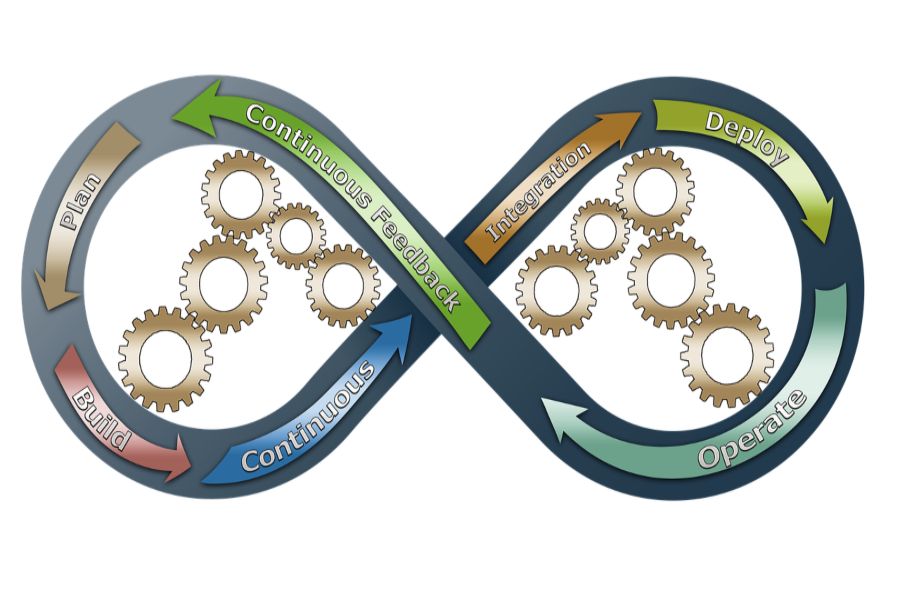DevOps, a fusion of Development (Dev) and Operations (Ops), signifies a cultural shift in the software development industry, encouraging collaboration and automating the processes. In the United States, where technological advancement thrives at a rapid pace, the growing demand for DevOps services has become vital in aligning organizations towards achieving efficiency, agility, and continuous improvement.
Understanding DevOps Services
In the complex world of software development, understanding DevOps services isn’t merely about knowing the terminology. It’s about embracing a philosophy that unifies teams, technologies, and goals.
Core Principles
- Collaboration: More than just working together, collaboration in DevOps transcends departmental silos. It establishes a shared understanding and responsibility among developers, testers, and operations staff.
- Automation: No longer a luxury, automation is an essential element in modern software development. It minimizes manual labor, reduces error, and accelerates development cycles.
- Continuous Improvement: This is the heartbeat of DevOps, pumping life into every process and strategy. Continuous improvement ensures that growth and optimization are never static.
Key Components
- Infrastructure Management: Here lies the foundation of the DevOps architecture. Whether it’s cloud computing, virtualization, or containerization, infrastructure management aligns technology resources with organizational needs.
- Continuous Integration/Continuous Deployment (CI/CD): This vital mechanism guarantees that code changes are automatically tested and deployed. It ensures a seamless, unbroken delivery chain from development to the end-user.
- Monitoring: This isn’t simply about watching performance metrics. It’s about proactive observation, diagnosing underlying issues, and predictive maintenance to ensure optimal operation.
The Advantages Of DevOps Services
Enhanced Collaboration and Communication
In DevOps, collaboration doesn’t just enhance productivity; it elevates the very culture of an organization. It fosters empathy, understanding, and a shared sense of purpose, translating to tangible results in product quality and customer satisfaction.
Agile Development and Continuous Delivery
The agility provided by DevOps is more than a methodology. It’s a nimble, adaptive approach that embraces change, responds to market demands, and places the customer’s needs at the forefront of development.
Infrastructure Automation
Imagine a world where mundane, repetitive tasks are automated. This is the world of DevOps, where infrastructure automation liberates human creativity and innovation. It’s not just about efficiency; it’s about unlocking potential.
Scalability and Flexibility
In the ever-changing landscape of technology, scalability is paramount. DevOps ensures that systems are prepared to expand or contract based on need, and flexibility ensures that organizations can adapt to new opportunities or challenges.
Implementing DevOps Services
Planning and Assessment
A successful DevOps transformation begins with a meticulously crafted plan. This entails a deep understanding of current infrastructure, clear articulation of goals, and a roadmap that navigates the unique challenges and opportunities of the organization.
Tool Selection and Integration
DevOps is as good as the tools it employs. Selecting the right combination of tools for CI/CD, automation, and monitoring is not merely a technical decision; it’s a strategic one that aligns with business objectives.
Continuous Integration and Deployment
Continuous integration and deployment are not mere practices within DevOps; they are the embodiments of its principles. They foster a culture where development, testing, and deployment become a seamless, fluid process that responds quickly to business needs and market changes.
The synergy of these elements within the framework of DevOps is not simply a pathway to more efficient software development; it’s a transformative journey that aligns technology, people, and business strategy. It’s about creating a culture where innovation thrives, and success is a shared endeavor. Whether in the United States or globally, embracing DevOps is not merely an option; it’s a compelling business imperative.
Overcoming Challenges
Common Challenges
Organizations may face challenges such as resistance to cultural change, lack of skilled professionals, and tool compatibility issues.
Strategies to Address Challenges
Solutions include fostering a collaborative culture, investing in employee training, and seeking professional DevOps Services, like those provided by Codica.
Real-World Examples
Companies like Netflix and Amazon have successfully implemented DevOps to streamline their development processes.
- Netflix: With over 200 million subscribers worldwide, they leverage DevOps for quick deployments and scalability.
- Amazon: Utilizing DevOps, they achieved quicker development cycles, allowing more frequent updates to their platforms.
Conclusion
In today’s fast-paced technological landscape, especially in regions like the United States where innovation is paramount, DevOps is not just an option but a necessity. Its core principles of collaboration, automation, and continuous improvement drive businesses towards success. By adopting DevOps services, organizations stand to gain enhanced communication, agile development, and unparalleled scalability, all of which contribute to the ultimate goal of streamlining software development.
Whether you’re an established business or an entrepreneur at the dawn of your venture, understanding and implementing DevOps can be the key to unlocking efficiency and innovation. The evidence is clear in the success stories of industry giants, and the opportunity is ripe for all who choose to grasp it.
